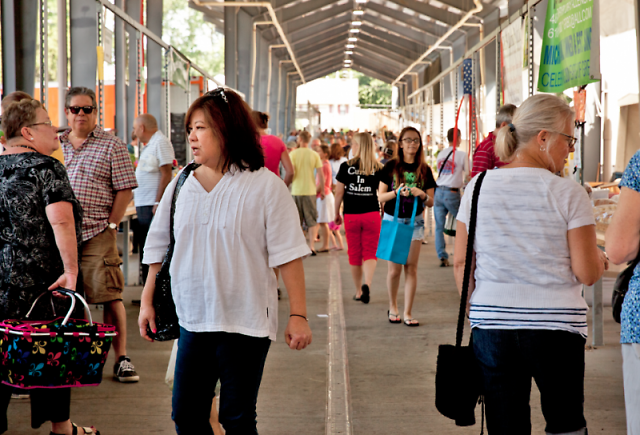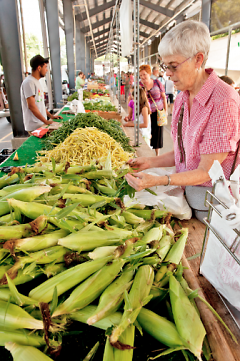Local Double Up Food Bucks program first in country to go digital, reduce lost benefits
January 14, 2015
Source: The Rapidian
Author: Eric Tank
Fulton Street Farmers Market is part of a handful of markets participating in the Double Up Food Bucks push to transition from token payment method to electronic.

Fulton Street Farmers Market / Eric Tank
The Fulton Street Farmers Market (FSFM), as well as about a dozen smaller markets in the area, is partnered with the Fair Food Network offering a program called Double Up Food Bucks (Double Up) that benefits low income persons by matching Bridge Card dollars for Michigan produce.
"It's basically a program that's funded by a number of benefactors, companies, charities that provide a way for those in need who have bad diets intake so they get a chance to double up on their food stamps that they obtain to eat fruits and vegetables. It basically supplements their diet," says Mike Ewer, Program Facilitator.
Following a successful pilot run at Detroit's Eastern Market in 2009, the program went statewide and landed in Grand Rapids in 2011. It was funded with a grant from the Open Society Foundations to try out a brand new incentive to get people to eat local, healthy food. In exchange for food stamps, wooden tokens are used as currency at the point of sale.
A person with Bridge benefits can receive "doubled dollars" up to $20 in a day. That means that a person using $20 of their benefits can purchase up to $40 worth of Michigan fruits and vegetables.
"[The food stamp dollars are] matched by a fund which has been set up by multiple benefactors," says Ewer.
Those matching benefactors include nearly 40 foundations and corporations, including local supporters like the W.K. Kellogg Foundation, Grand Rapids Community Foundation and the Frey Foundation. The Dyer Ives Foundation awarded the grant for the market to begin accepting food stamps.

Matched Food Bucks are only good for the purchase of Michigan fruits and vegetables. However, one program perk is that points can be earned from purchases other than produce, say meats. One poultry vendor has seen a revenue increase of 400% due to the program. So a shopper can purchase meat from a local farmer and use the points matched to purchase produce. The impact has a positive effect on Michigan agriculture and the local economy. Some vendors who were grandfathered in and previously sold out-of-state produce such as melons have been persuaded to switch to Michigan produce. People who have never been to farmers markets are now coming and returning due to the incentive program. The consumption of fresh fruits and vegetables has risen.
"The trickle down all across the board is a win-win for everybody," says Melissa Harrington, FSFM Executive Director.
Fulton Street Farmers Market / Eric Tank
Now the FSFM is in the middle of its own pilot program that seeks to digitize the entire system.
"Our farmers know that eventually one day everything will be electronic and no one will have a choice. We might as well be ahead of that curve and let every body else catch up to us," says Harrington.
The digital version will require vendors to accept electronic payment via an iPad or similar device utilizing a card reader and specialized app.
This eliminates the need for each individual vendor to apply for authorization to the United States Department of Agriculture (USDA) to accept food stamps. Instead, the FSFM is the applicant and vendors operate under their scope of authority.
Using a card rather than tokens also ensures that monies are spent on site at the point of sale. Tokens, like gift cards, can sometimes get lost and never used- thus the revenue has lost its benefit for both the shopper and the farmer.
Thanks to a new federal grant through the Farm Bill for incentives programs, Double Up will continue into 2015.
"The farm bill will have a lot of positive effect on farmers markets and their ability to accept food benefits and incentive programs to double people's benefits. And along with that I believe that the USDA is also recognizing that there is this switch to everything being electronic and we need to support our farmers markets to harness this technology," says Harrington.
Digitizing the program will also benefit WIC as it currently operates as a "use it or lose it" system that doesn't work efficiently by old token method of payment due to the monthly turnover, where monies can once again never make it to the vendors.
The pilot digitization program initiated by Kent County is the only one of its kind in the entire country to get rid of tokens and go electronic. The program runs from June through October. Any remaining points at the end of this season will roll over for next June.
Digitizing the program will benefit WIC as it currently operates as a "use it or lose it" system that doesn't work by using the old token method of payment due to the monthly turn over.
Around a dozen smaller markets in the area are also participating in the program including Sparta, Byron Center, Ada Village and Metro Health.
The program will be analyzed and evaluated at the end of the season and metrics of success will be published on the Fair Food Network website.
First posted at The Rapidian on August 12, 2014.







